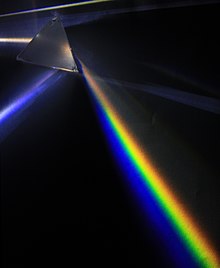Optics
branch of physics concerning light
Optics is the branch of physics which involves the behaviour and properties of light, including its interactions with matter and the construction of instruments that use or detect it.

| This science article is a stub. You can help out with Wikiquote by expanding it! |
Quotes
edit- (Ptolemy) left in his Optics, the earliest surviving table of angles of refraction from air to water. ...This table, quoted and requoted until modern times, has been admired... A closer glance at it, however, suggests that there was less experimentation involved in it than originally was thought, for the values of the angles of refraction form an arithmetic progression of second order... As in other portions of Greek Science, confidence in mathematics was here greater than that in the evidence of the senses, although the value corresponding to 60° agrees remarkably well with experience.
- Carl B. Boyer, The Rainbow: From Myth to Mathematics (1959)
- As men of inward light are wont
To turn their optics in upon't.- Samuel Butler, Hudibras, Part III (1678), Canto I, line 481, reported in Hoyt's New Cyclopedia Of Practical Quotations (1922), p. 593
- Music is the arithmetic of sounds as optics is the geometry of light.
- Claude Debussy, as quoted in Greatness : Who Makes History and Why by Dean Keith Simonton, p. 110
- Regardless of the prophetic value of Dirac’s description [on interference] his was probably the first discussion... including a coherent beam of light. In other words, Dirac wrote the first chapter in laser optics.
- F. J. Duarte (2003). Tunable Laser Optics. Elsevier Academic. p. 3. ISBN 0-12-222696-8.
- Why has not man a microscopic eye?
For this plain reason, Man is not a Fly.
Say, what the use, were finer optics giv'n,
T' inspect a mite, not comprehend the heav'n?- Alexander Pope, An Essay on Man (1733-34), Epistle I, line 193.
- Contemporary with Vitellio and Peccam was... Roger Bacon, a man of almost universal genius, and who wrote on almost every branch of science. He frequently quotes Alhazen on the subject of optics, and seems to have carefully studied his writings, as well as those of other Arabians, which were the fountains of natural knowledge in those days, and which had been introduced into Europe by means of the Moors in Spain. Notwithstanding the pains this great man took with the subject of opticks, it does not appear that, with respect to theory, he made any considerable advance upon what Alhazen had done before him.
- For any man with half an eye,
What stands before him may espy;
But optics sharp it needs I ween,
To see what is not to be seen.- John Trumbull, McFingal (1775-1782), Canto I, line 67.